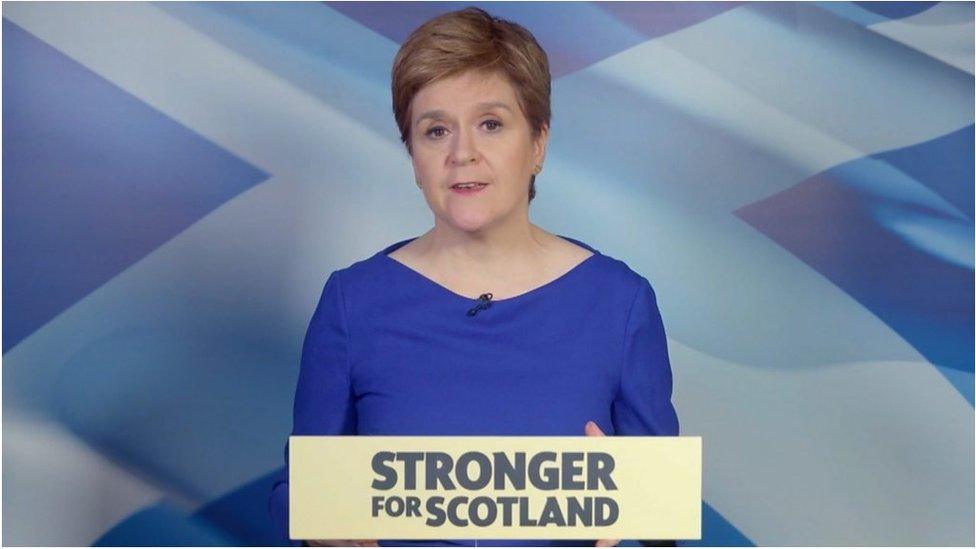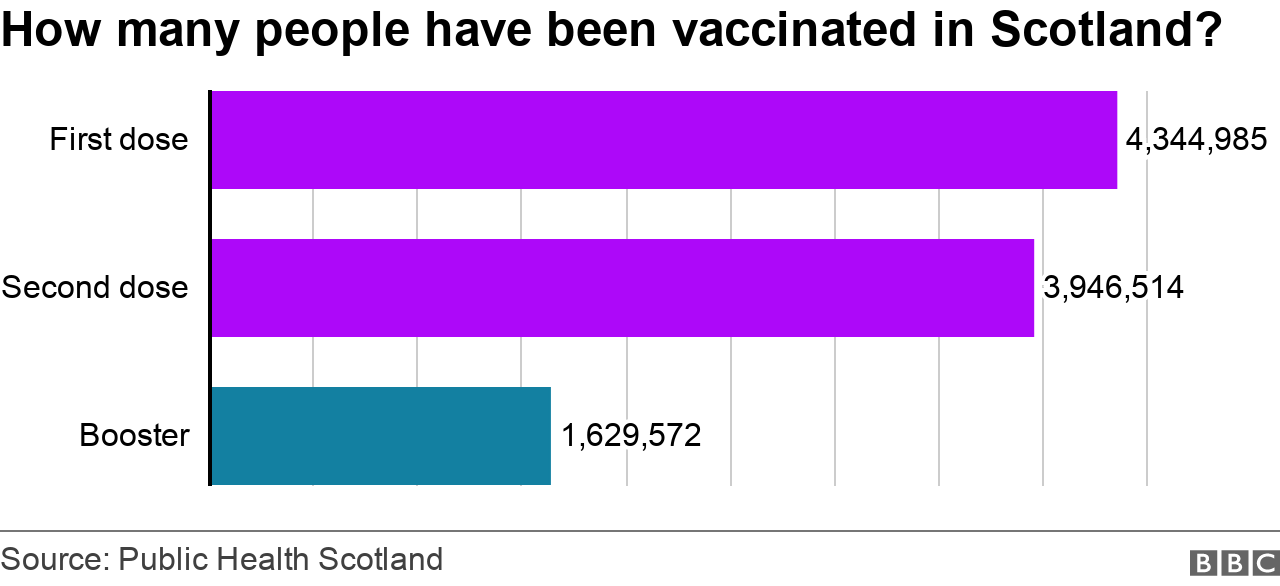Nicola Sturgeon: The first minister's conference speech fact-checked
- Published

Scotland's First Minister Nicola Sturgeon spoke of the challenges posed by Covid in her speech to the annual SNP conference. Delivered just hours after it was confirmed that six cases of the new Omicron variant had been detected in Scotland, she praised the NHS, spoke about vaccination rates and her party's plans to tackle child poverty.
We have been looking at some of her claims.
'Scotland is already the most vaccinated part of the UK'
According to UK government statistics, external, vaccination uptake in Scotland for the first dose (as a percentage of the population over the age of 12) is 90.8%, while in England it is 88.2%.
Uptake for the second dose is 82.5% in Scotland, compared with 80.2% in England.
The booster roll-out - which will be accelerated in the face of the Omicron variant - is at 34.1%, while England's uptake is at 30%, just above that of Wales. Northern Ireland's uptake is the lowest for all three doses of vaccine.
A total of 1,629,572 in Scotland have received a booster jab according to Public Health Scotland - 14,772,591 have in England.

'I am proud that NHS staff in Scotland have been awarded the highest pay rise in the UK'
In May, the Scottish government confirmed an NHS pay deal that will see many staff receive a 4% rise and will be backdated to 1 December 2020.
They include nurses and paramedics as well as domestic staff, porters, healthcare support staff and other frontline health workers - but not doctors and dentists, who have been offered a 3% rise.
Eligible staff on bands 1-4 who currently earn £24,973 or less will receive a flat rise of £1,009, while staff on the highest bands 8-9 will receive an increase of 2% or less.
In July, nurses and other NHS workers in England were offered a 3% pay rise by the UK government.
This rise was for most NHS staff including nurses, paramedics, consultants, dentists and salaried GPs and was backdated to April 2021. A similar increase was offered in Wales.
In August the BBC saw a letter by Northern Ireland's health minister suggesting that NHS workers would also be offered a 3% increase - an announcement is expected in the coming days.
'The cut [to universal credit] went ahead regardless - in Scotland it will push... 20,000 children into poverty.'
The Child Poverty Action Group estimates, external that about 20,000 children were pushed into relative poverty in Scotland by the ending of the £20 a week uplift to universal credit.
Nicola Sturgeon was talking about it as she announced that the Scottish Child Payment, external would be doubled to £20 a week, per child from April.
The payment is made to low-income families with children under the age of six and is in addition to other payments such as child benefit. The payment will be extended to all children under 16 in low-income households at the end of next year.
Independent anti-poverty organisation the Joseph Rowntree Foundation (JRF) estimated in a report last month, external that the two measures together would lift about 20,000 children out of poverty.
But it said that still would not be enough to make Scotland meet its interim child poverty targets by April 2024.
It said that "without urgent additional efforts, on social security or otherwise" the target would be missed.
The Scottish government's target is for the proportion of children in relative poverty to be down to 18% by April 2024.
The JRF said that doubling the Scottish Child Payment and extending it to under-16s would mean 22% would be in relative poverty by that date.
'In the course of next year, I will initiate the process necessary to enable a referendum before the end of 2023'
There has long been a dispute over whether the Scottish Parliament at Holyrood has the power to set up an independence referendum without the backing of the Westminster government.
In any case, Nicola Sturgeon has been clear that she wants the backing of UK ministers - as happened in 2014 - to ensure that any vote is recognised as a legitimate and binding one.
Last time, the power to hold a referendum was transferred to Holyrood after then-Prime Minister David Cameron signed a "section 30 order" - a technical term referring to the section of the Scotland Act which allows members of the Scottish parliament to pass laws in areas normally reserved by Westminster.
However, the current UK government has rebuffed Ms Sturgeon's requests for a similar deal.
If the first minister does table legislation at Holyrood without Boris Johnson's blessing, it is possible a challenge would be mounted at the UK Supreme Court to settle whether it goes beyond devolved powers.
If judges were to raise concerns about parts of that legislation, it could either be sent back to Holyrood to be amended - or scrapped altogether, if the problems are fundamental.
The pro-union side could also refuse to campaign in any referendum set up without Westminster backing, aiming to undermine the legitimacy of the vote - as happened in Catalonia, where a referendum in 2017 did not result in independence from Spain despite an overwhelming vote in favour among those who turned out.


